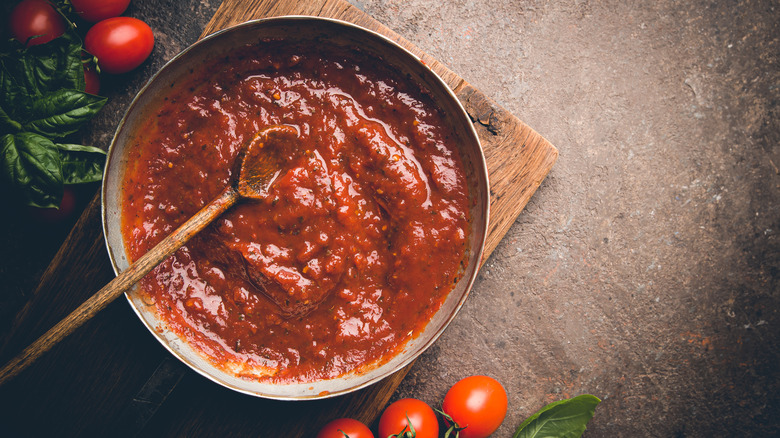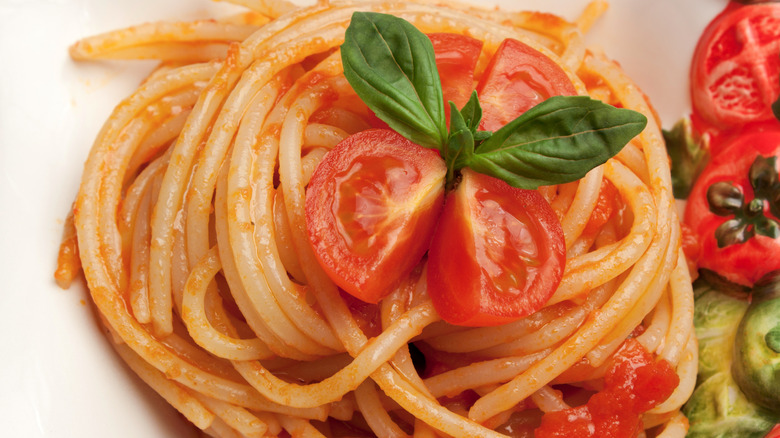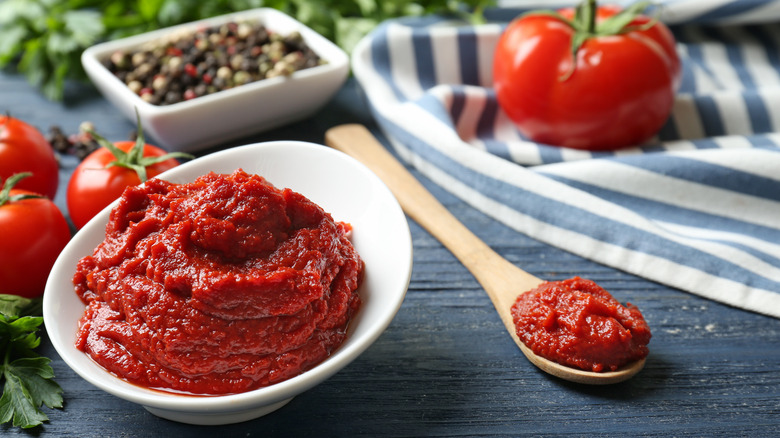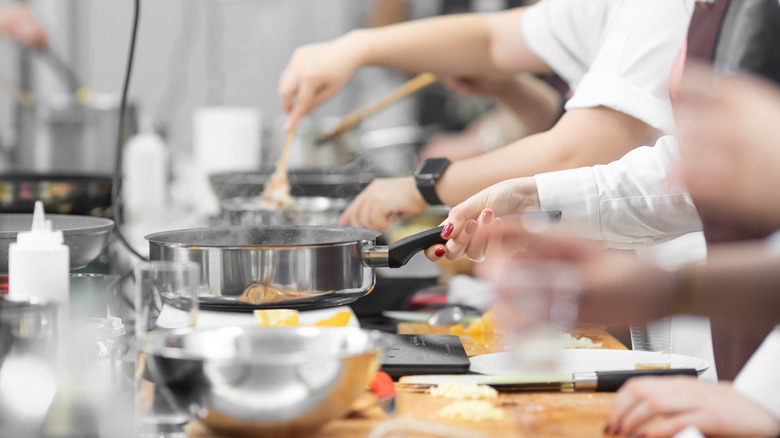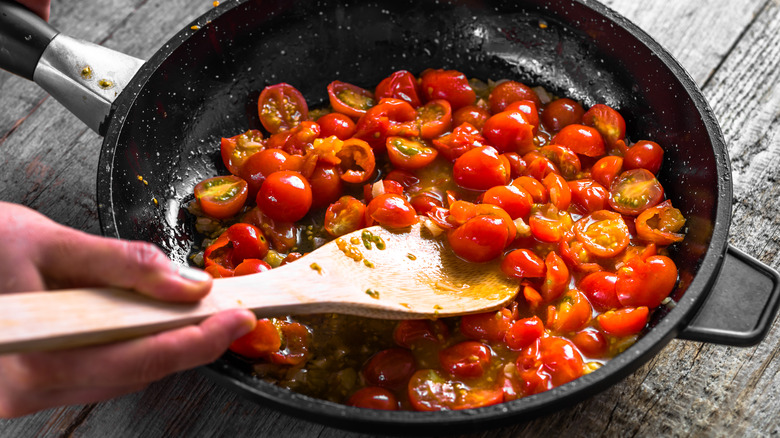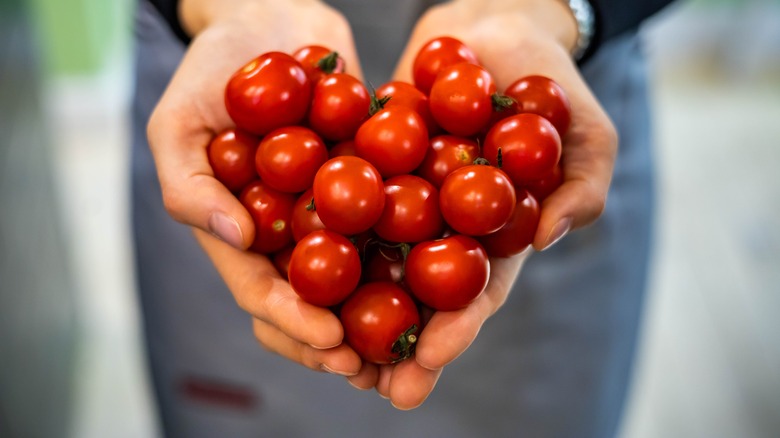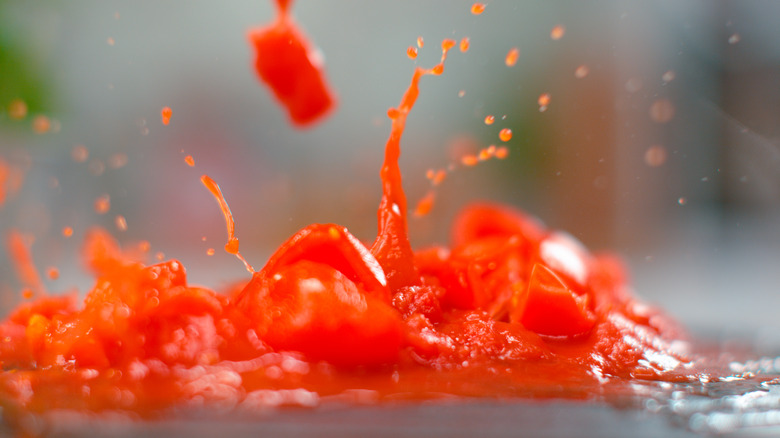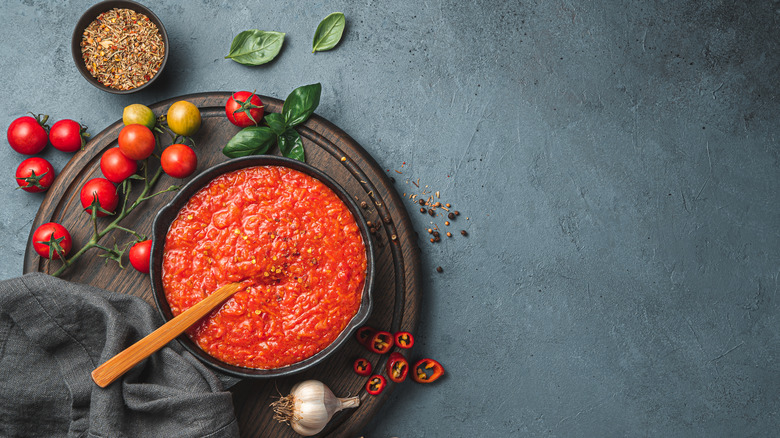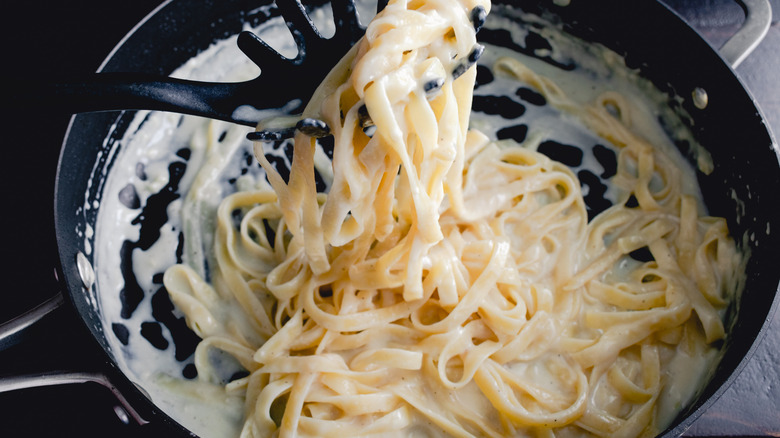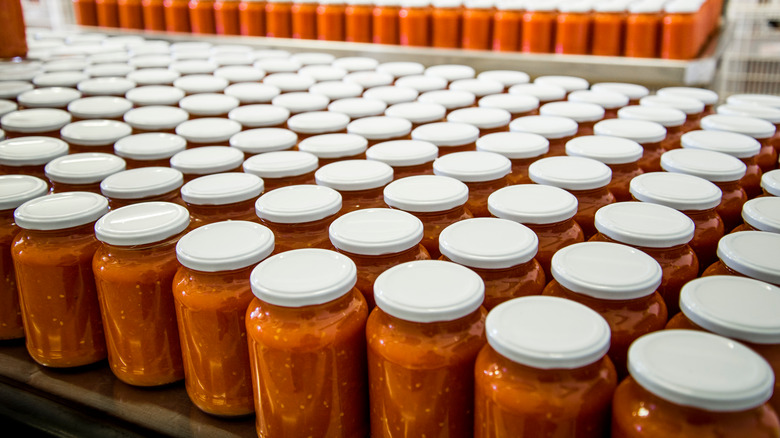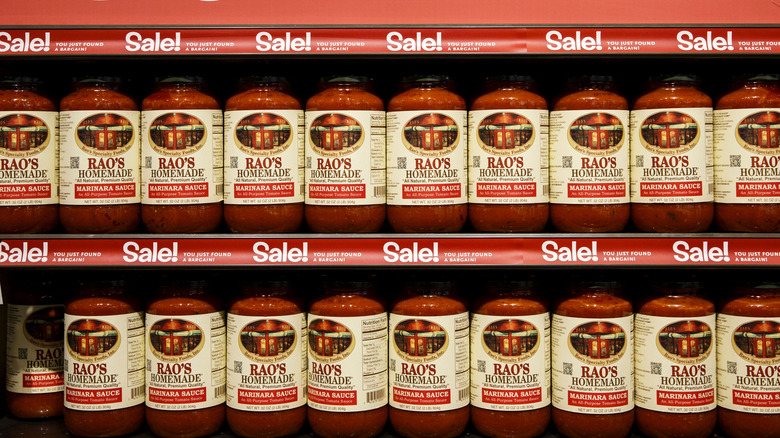The Untold Truth Of Marinara Sauce
We may receive a commission on purchases made from links.
Marinara sauce is the foundation of a multitude of iconic dishes and a staple of classic Italian cuisine. It's sometimes called the little black dress of Italian-American cooking, for its "perfect for every occasion" quality. Marinara's ingredients are minimal; four or five items -– tomatoes, garlic, herbs, onion, and extra virgin olive oil –- that combine to synergistically (some would say magically) create gastronomic glory.
Over hundreds of years and millions of chefs, the recipe has been altered here and there, but there's no dispute marinara sauce is consistently an element of Italy's premier cuisine offerings. Its simplicity and versatility give way to fast, easy and delicious meals that will fill your stomach but not empty your wallet. Marinara freezes well, blesses any pasta it encounters, and truth be told, has a lot more going for it than most people realize. There's much more to this preeminent Italian staple than meets the eye, adding plenty of reasons to whip up a pot of fresh marinara sauce tonight.
How marinara sauce got its name
Several theories abound on the origins of marinara sauce. According to the New York Times, marinara (meaning "of the sailor" in Italian) was a simple sauce created hundreds of years ago for sailors on sea vessels in the shipping trade. Oddly, marinara sauce does not contain seafood or fish, though it was invented near the Italian coast, most likely beside the Bay of Naples.
One explanation suggests that it was an inexpensive and light, fast-cooking sauce that paired well with shellfish or fish, which of course was plentiful. Another line of reasoning suggested it was a homecoming meal; Italian women whipped up the marinara sauce for their fishermen husbands when they returned to port. Marinara sauce offered an inexpensive option for a fast meal that could be prepared at a moment's notice with only a few ingredients.
One last theory on marinara's origins, according to Paesana, is that Neapolitan fishermen at sea could create a Pinterest-worthy meal that took practically no time to prepare ... even for a fisherman. No matter how marinara sauce began, once it arrived it was here to stay.
There are lots of twists on the classic marinara sauce recipe
Purists might want to skip this section, because they would argue there's no messing with perfection. Classic marinara should stay, well, classic. Don't fix something that's not broken. But others with perhaps a more adventurous constitution might consider the almost limitless alternatives to the classic marinara sauce.
Renowned chef Jamie Oliver writes about 10 twists on his classic marinara sauce that may delight the senses and please the palate. From somewhat predictable additions like mushrooms, cherry tomatoes, and roasted tomatoes, the adaptations also suggest provocative additions -– peas, turkey, and spicy tuna. The options can be simply tossing in more fresh vegetables –- for a safe but thoroughly delicious sauce. Food & Wine Magazine advises that inventive marinara recipe additions might include curry, kimchi or even Medjool dates.
There's really no wrong answer, and you may discover the next big thing ... at least around your dinner table, so plan to put Nona's classic recipe aside for one evening to create what may become a new classic in your home, with your own personal spin on the iconic marinara sauce. Think outside the box!
Master courses in Italy are taught about marinara sauce
Creating marinara is a foundation of Italian cuisine, and now enterprising chefs, both professional and otherwise, can immerse themselves in an Italian cucina to learn the authentic marinara techniques. Why not plan your next vacation to attend a Master of Pasta and Sauces course in Italy with Accademia Italiana Chef? Courses are held for foreign students at the Empoli School in Florence and the Bologna School.
Each Academy's cooking school is structured to teach traditional Italian cuisine in a small group setting, educating only 20 or so students at a time, and providing plenty of Facetime with master chefs. The perfectly equipped laboratories provide 74 hours of training over a 2-week period, with about 7.5-hour days.
Imagine: You will be guided by an award-winning Italian chef, and you'll be certified in the master program upon completion, with a solid understanding of both pasta and sauces. Plan to learn the key concepts to the perfect marinara sauce, as well as how to skillfully prepare pasta and other famously-consumed Italian dishes. It's a bit pricey at 2,000 Euros, but students can expect to learn from great chefs about the successful pairing of a classic marinara sauce with compatible food, demonstrating technical expertise and a holistic understanding of the overall dish.
Marinara sauce is full of vitamins and minerals
Here's some great news: marinara sauce is actually good for you! The blend of tomato, garlic, herbs, and olive oil offers dining glory, but also infuse life-enhancing vitamins and minerals. Despite the fact that technically a tomato is a fruit, with marinara's main ingredient being tomatoes, you can even count the sauce as a serving of vegetables, so long as it includes at least one large tomato, according to verywellfit.com. The reasoning goes that since tomatoes are prepared and served as vegetables, they're generally considered a vegetable from a culinary perspective, plus tomatoes possess many of the healthy vitamins and minerals found in vegetables.
Nonetheless, tomatoes pack a vitamin-charged punch in the classic marinara, acting as a great source of vitamin C, A, E, K, B6, niacin, copper, and potassium. Specifically, a cup of marinara sauce can supply 50% of your daily value of niacin (vitamin B3). According to the National Institutes for Health (NIH), niacin helps turn the food into energy and is important for the development and function of the body's cells.
The good news keeps on coming: Nutritiondata.com reports one serving of marinara sauce meets 39% of your daily vitamin A and 31% of daily vitamin E requirements. On top of all that, one serving of marinara possesses 45% of your daily vitamin K, which promotes bone growth and prevents bone loss. Suffice to say, dining on marinara sauce promotes healthy living and life-giving nutrients with every bite.
Marinara sauce may help fight heart disease
According to the Centers for Disease Control and Prevention, heart disease is the leading cause of death in the U.S., so the old adage "you are what you eat" may ring true. We've all heard of the Mediterranean Diet. According to the Mayo Clinic, this plant-based eating regime is centered around foods consumed in Italy, Greece, and other countries based near the Mediterranean Sea. People began to pay attention to the diet of those living in this region back in the 1950s, when studies showed that heart disease was much reduced there as compared to the United States. Since then, study after study indicates the Mediterranean diet can be beneficial in preventing heart disease and strokes.
In regard to heart health, a study published in Translational Research found that consuming cooked tomato sauce (aka marinara) can protect against heart issues caused by low-density lipoprotein (LDL or "bad") cholesterol. Researchers conclude that cooked tomatoes, the heartbeat of marinara sauce, can help reduce oxidative damage and improve the activity of high-density lipoprotein (HDL or "good") cholesterol.
And finally, according to an article in Frontiers in Pharmacology, tomatoes are rich in lycopene, which may reduce the risk of heart disease and lower the risk of a stroke. All that, and it tastes amazing too!
Marinara sauce helps fight cancer
You just read about a few of lycopene's superpowers, but you might not know it also may help prevent a range of cancers, according to the Wall Street Journal. Approximately 50% of cancer cases and 35% of cancer deaths in the United States can be attributed to poor diet, researchers reported in the Toxicological Sciences medical journal. Marinara sauce combats these stats since lycopene is an antioxidant that protects the body's prostate cells.
Studies indicate that as antioxidants, lycopene may protect against cancer by killing cancer cells and stopping them from growing. There is probable evidence that eating tomatoes may reduce your risk of stomach, lung, colon, and prostate cancer, according to the American Institute for Cancer Research. By consuming delicious marinara sauce, you may be reaping the added benefit of tomatoes' natural antioxidants. This may just be the tip of the iceberg; much more research needs to be conducted to evaluate lycopene's potential cancer-fighting properties.
Marinara sauce is good for gut health
You may have heard of the term "gut health," but what is it? According to Live Science, your gut breaks down the meals you eat into a functional form that can enter the bloodstream and go into your body where it is needed. That's important because your gut health can impact your entire body. There is increasing evidence suggesting a healthy gut microbiome is important for our mental health, as well as an effective immune system.
Here's where marinara sauce is your friend. The fiber from marinara sauce contributes to good gut health, according to researchers in the Journal of the Science of Food and Agriculture. Tomatoes also possess probiotic properties which are great for your gut. Furthermore, a Journal of Functional Foods study showed that tomatoes may be able to boost the activity of healthful bacteria in the gut. Researchers found that specifically, cooking tomatoes enhances the extractability of antioxidants. Way to go, marinara!
Marinara sauce is lower in calories than other Italian sauces
Marinara sauce is a much less fatty, lower-calorie option than, say, Alfredo sauce. If you're working on reducing your weight, marinara sauce would be a smarter option for you. According to Nutritionix, a serving of Alfredo sauce is loaded with fat and calories, thanks to the cream, cheese, and butter that bring flavor. Get this: Alfredo sauce has over 500 calories per ½ cup serving, with a whopping 51 grams of fat. Compared to that, a ½ cup serving of marinara sauce is about 66 calories and 2 grams of fat.
Wanna lose weight but still enjoy flavorful meals? Consider pasta alternatives like zucchini noodles, squash noodles, or quinoa pasta to enjoy with your marinara sauce, instead of traditional pasta. Each contains a multitude of vitamins, minerals, protein, and gluten-free, healthy carbs. The old saying, "a moment on the lips, forever on the hips," does not apply when creating nutritious, healthy options like these with classic marinara sauce.
Marinara sauce is a big seller
It looks like the popularity of marinara sauce won't be going away anytime soon. According to data from the U.S. Census, 269.62 million Americans used spaghetti/pasta sauce in 2020. This figure is projected to increase to 276.84 million in 2024. The market keeps growing!
According to Databridge Market Research, the global pasta sauce market is expected to expand at a growth rate of 7% from 2020 to 2027. The research considers many factors like increasing demand from restaurants and hotels, rising growth of the fast food industry, changing consumer taste, and rising disposable income of consumers.
It probably won't surprise you to know that North America dominates the pasta sauce market, due to the growth of the American retail sector along with aggressive advertising and celebrity brand endorsement. What does this boil down to in dollars and cents? According to Allied Market Research, the pasta sauce market was valued at $2.9 billion in 2018 and is estimated to reach $4.6 billion by 2026. That's a lot of sauce!
The best store-bought marinara sauce?
Hands down, Rao's Homemade Marinara Sauce wins. Look at the multitude of "Best of" lists out there — including our own best grocery spaghetti sauces list — and Rao's is consistently at the top of the heap. It's on the pricier side, but fans swear by it. According to Rao's website, a 24-ounce jar costs $8.99, and a 32-ounce jar will set you back $9.99. They even offer a teeny-weeny 15.5-ounce jar for $5.99.
The sauce was first served in their legendary New York Rao's restaurant, and later at Rao's Las Vegas and Rao's Los Angeles. The marinara was such a hit that owners jarred it and launched Rao's Homemade premium pasta sauce brand. Shoppers can try options like classic marinara sauce, tomato basil, roasted garlic in the red sauce department, but the classic marinara is the consistent winner. It's got no tomato blends, no paste, no water, no starch, no filler, no colors and no added sugar. But it DOES have an irresistible taste.
Why would culinary luminary Ina Garten swear by Rao's as her go-to for store-bought sauce if it weren't so? It's packed with just the right amount of Italian plum tomatoes, olive oil, garlic, onion, basil, oregano, salt, and black pepper. Sounds like a winning sauce, for amateur and pro chefs alike!
